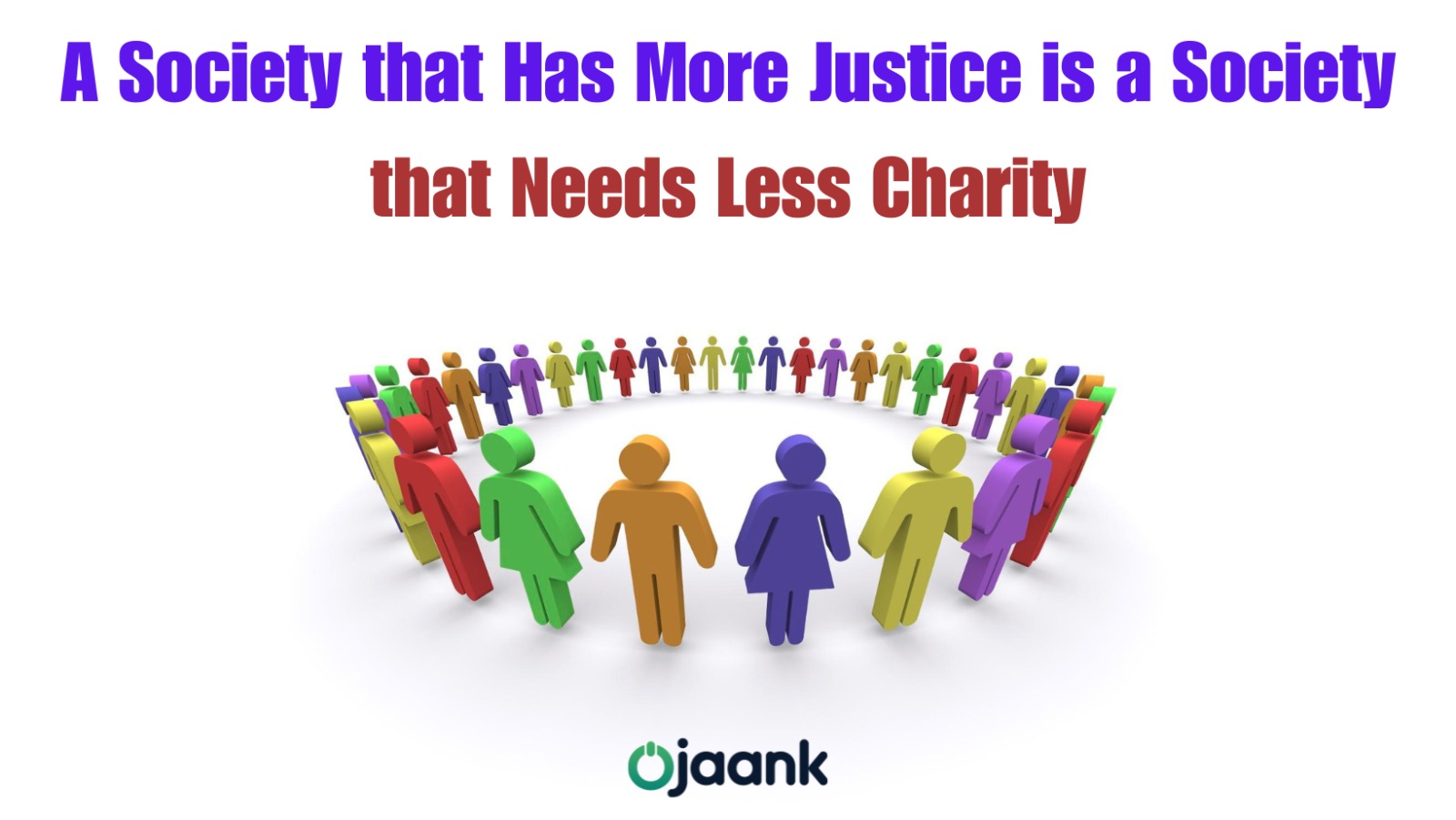A Society that Has More Justice is a Society that Needs Less Charity

In an ideal world, every member of society should have access to the basic necessities of life, such as food, shelter, education, and healthcare. However, the reality is far from perfect, and many individuals and communities around the world continue to struggle with poverty and inequality. In such circumstances, charitable organizations and individuals step in to provide aid and support to those in need. While charity is undoubtedly a noble and essential endeavor, it is equally important to recognize that a society that has more justice in place requires less charity. In this blog, we will explore the relationship between justice and charity, and how striving for a more just society can ultimately reduce the need for charity.
Defining Justice and Charity
Before delving deeper into the topic, it's crucial to define what we mean by justice and charity.
Justice: Justice refers to the fair and equitable distribution of resources, opportunities, and benefits within a society. It involves ensuring that everyone has equal access to essential services, opportunities for growth, and protection under the law.
Charity: Charity, on the other hand, involves voluntarily giving aid, resources, or assistance to those in need. It often takes the form of donations, philanthropic activities, and volunteer work to address specific social or humanitarian issues.
The Role of Justice in Reducing Inequality
A just society strives to minimize inequality by addressing the root causes of poverty and discrimination. Here are some key ways in which justice can help reduce inequality:
a. Equal Access to Education: In a just society, education is accessible to all, regardless of their socioeconomic background. Quality education empowers individuals to break the cycle of poverty and leads to better employment opportunities.
b. Fair Economic Policies: A just society implements policies that promote economic fairness. This includes progressive taxation, minimum wage laws, and social safety nets that help uplift the marginalized.
c. Elimination of Discrimination: Justice involves eradicating discrimination based on race, gender, religion, or other factors. By providing equal opportunities for all, a just society ensures that individuals are not held back by systemic biases.
d. Accessible Healthcare: Universal healthcare is a hallmark of a just society. It ensures that individuals can receive medical treatment regardless of their financial situation, reducing health-related disparities.
Charity as a Band-Aid Solution
While charity plays a vital role in alleviating immediate suffering and addressing urgent needs, it often serves as a band-aid solution to systemic problems. Here are some reasons why charity alone is insufficient to create lasting change:
a. Temporary Relief: Charitable efforts may provide temporary relief, such as food and shelter, but they often do not address the underlying causes of poverty and inequality.
b. Inequality Continues: Relying solely on charity can perpetuate the status quo of inequality. It may give the impression that society is taking care of its most vulnerable members without addressing the structural issues that lead to their suffering.
c. Limited Resources: Charitable organizations have limited resources and can only help a fraction of those in need. They cannot replace the comprehensive support that a just society should provide.
Striving for Justice as a Solution
To reduce the need for charity, society must prioritize justice as a long-term solution. Here's how justice can replace charity as a means of addressing societal issues:
a. Education and Training Programs: Investing in education and vocational training programs can equip individuals with the skills they need to secure stable employment and support themselves, reducing the need for charitable assistance.
b. Fair Wages and Worker Protections: Implementing fair labor practices, minimum wage laws, and workplace protections can ensure that individuals earn a living wage and do not have to rely on charity to make ends meet.
c. Social Safety Nets: A just society should have robust social safety nets in place, such as unemployment benefits and food assistance programs, to support individuals during times of hardship.
d. Healthcare Access: Universal healthcare ensures that medical treatment is accessible to everyone, reducing the burden on charitable medical services.
The Role of Government and Policy
Government policies play a pivotal role in shaping the level of justice and the need for charity within a society. Here's how policy reforms can contribute to a more just society:
a. Progressive Taxation: Implementing progressive taxation policies can redistribute wealth and resources more equitably, providing funding for essential services and reducing the need for charitable contributions.
b. Anti-Discrimination Laws: Enforcing and expanding anti-discrimination laws ensures that individuals have equal access to opportunities and reduces the need for charity to address disparities.
c. Social Programs: Expanding and strengthening social programs, such as affordable housing initiatives and job training programs, can help individuals attain self-sufficiency.
d. Healthcare Reforms: Comprehensive healthcare reforms can ensure that everyone has access to quality medical care, reducing the demand for charitable healthcare services.
In conclusion, a society that has more justice is undeniably a society that needs less charity. Justice addresses the root causes of poverty and inequality, providing individuals with the tools and opportunities they need to thrive independently. While charity serves a vital role in providing immediate relief, it should not be a substitute for comprehensive policy reforms and social justice initiatives. By striving for a more just society through government policies and collective efforts, we can significantly reduce the need for charity and create a more equitable world for all.
As we continue to work towards a better future, let us remember that justice and charity can complement each other. Charity can provide a safety net in times of crisis, while justice lays the foundation for a society where charity is needed less and less. Together, we can build a world where everyone has a fair chance to succeed, and where the concept of charity becomes a symbol of collective goodwill rather than a necessity for survival.